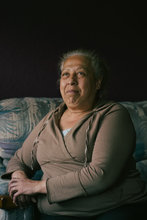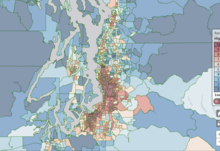0
Research
Community:
Mar 20, 2019
Launched in 2016, the Denver Supportive Housing SIB aims to support residents struggling with homelessness, substance use, and mental health problems by increasing the number of people getting and staying housed and reducing the number of days they spend in jail. The permanent supportive housing model combines a permanent housing subsidy with wraparound services, such as mental health counseling, to help people improve their stability. In Denver, MHCD and the Colorado Coalition for the Homeless (CCH) were selected to offer these services as part of the SIB.
Authored by: The Urban Institute
Topics: Cost effectiveness, Criminal justice, Homelessness, Housing, Low-income, Pacific Northwest, Partnerships, Research, Substance abuse
 Shared by Mica O'Brien
Shared by Mica O'Brien
Mica O'Brien posted a
on Mar 26, 2019
Launched in 2016, the Denver Supportive Housing SIB aims to support residents struggling with homelessness, substance use, and mental health problems by increasing the number of people getting and staying housed and reducing the number of days they spend in jail.
0
News Article
Community:
Feb 8, 2019
The Seattle city auditor recommended the city expand access to 24-hour bathroom and hygiene facilities to mitigate the public health risks of unsanctioned homeless tent camps and improve coordination among outreach teams.
Authored by: Vernal Coleman for The Seattle Times
Topics: Homelessness, Housing, Pacific Northwest
 Shared by Mica O'Brien
Shared by Mica O'Brien
Mica O'Brien posted a
on Feb 14, 2019
Vernal Coleman for The Seattle Times
The Seattle city auditor recommended the city expand access to 24-hour bathroom and hygiene facilities to mitigate the public health risks of unsanctioned homeless tent camps and improve coordination among outreach teams.
0
Research
Community:
Mar 1, 2018
Medicaid coverage reduced the prevalence of undiagnosed depression by almost 50% and untreated depression by more than 60%. It increased use of medications and reduced the share of respondents reporting unmet mental health care needs by almost 40%.
Authored by: Katherine Baicker, Heidi Allen, Bill Wright, Sarah Taubman, and Amy Finkelstein for Milbank Memorial Fund
Topics: Depression, Low-income, Medicaid / Medicare, Mental health, Metrics, Pacific Northwest, Research
 Shared by Mica O'Brien
Shared by Mica O'Brien
Mica O'Brien posted a
on Jan 24, 2019
Katherine Baicker, Heidi Allen, Bill Wright, Sarah Taubman, and Amy Finkelstein for Milbank Memorial Fund
Medicaid coverage reduced the prevalence of undiagnosed depression by almost 50% and untreated depression by more than 60%. It increased use of medications and reduced the share of respondents reporting unmet mental health care needs by almost 40%.
0
News Article
Community:
May 15, 2018
Since federal public housing assistance was first created in 1939 amid the Great Depression, public housing advocates have struggled with how to move low-income families to higher-opportunity neighborhoods, typically defined as neighborhoods with less poverty (though experts argue there are other ways to measure opportunity, including quality of schools and access to public transportation, and KCHA uses a broader “opportunity index” to compare locations). The Moving to Opportunity program, a federal demonstration in the 1990s, documented outcomes of families moving to neighborhoods with lower poverty rates. The program didn’t show immediate health and economic gains at its conclusion, but in 2015, a landmark paper by Raj Chetty and others showed that for children who moved before the age of 13, the economic and social gains were dramatic. Not coincidentally, 12 and younger was the target age for kids participating in the KCHA opportunity moves.
Authored by: Rebecca Gale for Slate
Topics: Child welfare, CLPHA, Early childhood, Education, Mobility, MTW, Pacific Northwest, Partnerships
 Shared by Mica O'Brien
Shared by Mica O'Brien
Mica O'Brien posted a
on Jan 18, 2019
Since federal public housing assistance was first created in 1939 amid the Great Depression, public housing advocates have struggled with how to move low-income families to higher-opportunity neighborhoods, typically defined as neighborhoods with less poverty (though experts argue there are other wa
0
Interactive
Community:
Jan 11, 2019
A new mapping tool can help you learn more about the state of environmental health, wherever you live in Washington.
Authored by: Kamna Shastri for KUOW
Topics: Health, Housing, Pacific Northwest, Research
 Shared by Housing Is
Shared by Housing Is
Housing Is posted a
on Jan 17, 2019
A new mapping tool can help you learn more about the state of environmental health, wherever you live in Washington.
0
News Article
Community:
Dec 24, 2018
When homeless people get released, their issues combined with living on the street will usually land them back in emergency rooms, costing hospitals like Harborview Medical Center — which operates on a thin margin — time and money. One solution is a type of respite program that provides short-term care to homeless patients who are too sick to be on the streets or in a shelter, but not sick enough to continue to take up a hospital bed.
Authored by: Scott Greenstone for The Seattle Times
Topics: Health, Homelessness, Housing, Pacific Northwest, Partnerships, Place-based, Preventative care, Stability
 Shared by Mica O'Brien
Shared by Mica O'Brien
Mica O'Brien posted a
on Jan 7, 2019
Scott Greenstone for The Seattle Times
When homeless people get released, their issues combined with living on the street will usually land them back in emergency rooms, costing hospitals like Harborview Medical Center — which operates on a thin margin — time and money.
0
News Article
Community:
Dec 1, 2018
When schools started back up this fall, many across the country witnessed something that’s become as common on the first day as new backpacks and freshly sharpened pencils: another surge of homeless and housing-insecure schoolchildren.
Authored by: Mattie Quinn for Governing
Topics: East Coast, Education, Homelessness, Housing, Pacific Northwest, Partnerships, Transportation, Youth
 Shared by Mica O'Brien
Shared by Mica O'Brien
Mica O'Brien posted a
on Dec 18, 2018
Mattie Quinn for Governing
When schools started back up this fall, many across the country witnessed something that’s become as common on the first day as new backpacks and freshly sharpened pencils: another surge of homeless and housing-insecure schoolchildren.
0
News Article
Community:
Nov 2, 2018
Public health officials have known for decades that where you live greatly influences how long you can live. Residents who live in neighborhoods free of violence with good housing and schools and with close access to quality medical care, food and parks live longer than those who don’t. Now a recently released report — called the United States Small-Area Life Expectancy Estimates Project, or USALEEP — shows in obvious, color-coded terms the range and proximity of that disparity.
Authored by: Christian Hill for The Register-Guard
Topics: Community development, Health, Low-income, Pacific Northwest, Place-based, Research
 Shared by Mica O'Brien
Shared by Mica O'Brien
Mica O'Brien posted a
on Nov 8, 2018
Christian Hill for The Register-Guard
Public health officials have known for decades that where you live greatly influences how long you can live. Residents who live in neighborhoods free of violence with good housing and schools and with close access to quality medical care, food and parks live longer than those who don’t.
0
News Article
Community:
Oct 16, 2018
Some community colleges have found innovative partnerships with their public housing authorities may help combat student homelessness.
Authored by: Ashley A. Smith for Inside Higher Ed
Topics: Asset building, CLPHA, Education, Homelessness, Housing, Low-income, Midwest, Pacific Northwest, Partnerships, Post-secondary, Stability, Workforce development
 Shared by Mica O'Brien
Shared by Mica O'Brien
Mica O'Brien posted a
on Oct 24, 2018
Ashley A. Smith for Inside Higher Ed
Some community colleges have found innovative partnerships with their public housing authorities may help combat student homelessness.
0
News Article
Community:
Oct 7, 2018
The HUB is finalizing rules that ban lying down and sprawling out on couches, sleeping for more than 30 minutes, using the restroom for cutting hair or bathing, and panhandling.
Authored by: Scott Greenstone for The Seattle Times
Topics: Homelessness, Pacific Northwest, Post-secondary, Youth
 Shared by Mica O'Brien
Shared by Mica O'Brien
Mica O'Brien posted a
on Oct 11, 2018
Scott Greenstone for The Seattle Times
The HUB is finalizing rules that ban lying down and sprawling out on couches, sleeping for more than 30 minutes, using the restroom for cutting hair or bathing, and panhandling.
0
Webinar
Community:
Sep 26, 2018
The Colorado Coalition for the Homeless (CCH) has been investing in supportive housing since 1990. Since that time, this comprehensive community health center has developed nearly 1,700 units of housing, and is one of the country’s leaders in integrating health care and housing for a vulnerable population.
This webinar discusses how CCH finances its capital development; how they plan, design, and manage multiple projects simultaneously; how they integrate housing and health care services; and how they include property management staff in a coordinated approach to care. This conversation with members of CCH’s leadership complements our recent policy brief and included time for audience Q&A.
Authored by: National Health Care for the Homeless Council
Topics: Health, Homelessness, Low-income, Medicaid / Medicare, Mental health, Pacific Northwest, Place-based, Supportive housing
 Shared by Mica O'Brien
Shared by Mica O'Brien
Mica O'Brien posted a
on Oct 9, 2018
National Health Care for the Homeless Council
The Colorado Coalition for the Homeless (CCH) has been investing in supportive housing since 1990.
0
Case study
Community:
Jun 25, 2018
The King County Housing Authority (KCHA), in partnership with the Highline School District and the nonprofit social service organization Neighborhood House, launched the Student and Family Stability Initiative (SFSI) pilot program in 2013 to provide housing and employment supports to homeless and unstably housed families with children enrolled in Highline elementary schools. In 2016, KCHA contracted with the Urban Institute (Urban) to conduct a process and outcome evaluation of the program’s first three pilot years. This evaluation documents how SFSI works, who it serves, and how well it helps participants achieve housing stability. This report synthesizes findings from data collection conducted over approximately 10 months that included document review, interviews with SFSI stakeholders, and analysis of program and other relevant KCHA administrative data.
Authored by: Martha M. Galvez, Amanda Gold, and Sara McTarnaghan
Topics: Attendance, Dual-generation, Education, Family engagement, Housing, Low-income, Pacific Northwest, Partnerships, Place-based, Research, Stability, Workforce development, Youth
 Shared by Mica O'Brien
Shared by Mica O'Brien
Mica O'Brien posted a
on Sep 18, 2018
Martha M. Galvez, Amanda Gold, and Sara McTarnaghan
The King County Housing Authority (KCHA), in partnership with the Highline School District and the nonprofit social service organization Neighborhood House, launched the Student and Family Stability Initiative (SFSI) pilot program in 2013 to provide housing and employment supports to homeless and un
0
Report
Community:
Aug 9, 2018
The Colorado Coalition for the Homeless created the Denver Housing First Collaborative (DHFC) in 2003 with funding provided by a collaboration of federal agencies. The DHFC involved CCH as the lead agency, Denver Department of Human Services (DDHS), Denver Health (DHHA), Arapahoe House, the Mental Health Center of Denver (MHCD) and the Denver VA Medical Center. The DHFC is designed to provide comprehensive housing and supportive services to chronically homeless individuals with disabilities. Initial federal funding created the capacity to house and serve 100 chronically homeless individuals. The program uses a housing first strategy combined with assertive community treatment (ACT) services, providing integrated health, mental health, substance treatment and support services.
Authored by:
Topics: Cost effectiveness, Funding, Health, Homelessness, Housing, Pacific Northwest, Partnerships, Research, Stability, Supportive housing
 Shared by Housing Is
Shared by Housing Is
Housing Is posted a
on Aug 9, 2018
The Colorado Coalition for the Homeless created the Denver Housing First Collaborative (DHFC) in 2003 with funding provided by a collaboration of federal agencies.
0
Interactive
Community:
Jul 20, 2018
Kaiser Permanente NW Community Benefit intends to award at least $1.5 million in community grants to support organizations that help people with behavioral health challenges to secure and maintain safe, stable housing. A minimum of five grants of up to $325,000 will be awarded for projects lasting 3 ½ years. Projects must include the involvement of peers or community health workers (CHWs) and must involve collaboration between housing providers, health care providers (including behavioral health service providers) and those community organizations employing peers or CHWs.
Authored by:
Topics: Funding, Health, Homelessness, Housing, Mental health, Pacific Northwest, Partnerships, Place-based, Preventative care, Substance abuse
 Shared by Housing Is
Shared by Housing Is
Housing Is posted a
on Jul 20, 2018
Kaiser Permanente NW Community Benefit intends to award at least $1.5 million in community grants to support organizations that help people with behavioral health challenges to secure and maintain safe, stable housing.
0
News Article
Community:
Sep 7, 2017
In Tacoma, Washington, and other U.S. cities, housing departments are collaborating with school districts to give low-income and homeless students a leg up.
Authored by: Mimi Kirk for CITY LAB
Topics: CLPHA, Education, Housing, Pacific Northwest, Partnerships, Place-based, Stability
 Shared by Abra Lyons-Warren
Shared by Abra Lyons-Warren
Abra Lyons-Warren posted a
on Sep 7, 2017
In Tacoma, Washington, and other U.S. cities, housing departments are collaborating with school districts to give low-income and homeless students a leg up.
0
Video
Community:
Jul 19, 2017
Authored by: CLPHA
Topics: CLPHA, Data sharing, Education, Housing, Low-income, Pacific Northwest, Partnerships, West Coast
 Shared by CLPHA Admin
Shared by CLPHA Admin
CLPHA Admin posted a
on Jul 19, 2017
Recorded at CLPHA's 2017 Affordable Housing & Education Summit on July 12, 2017.
Increasingly, a wide range of entities—housers, educators, cities—are using data sharing to increase effectiveness across systems. Yet, many systems still do not want to engage in dating sharing or have encountered resistance. This roundtable not only discusses how partners made data sharing possible, but also looks to the future: how the process has gone since initial implementation, what partners have learned from their data sharing efforts, and next steps for the work.






 Shared by Housing Is
on Jan 17, 2019
Shared by Housing Is
on Jan 17, 2019









 Shared by Housing Is
on Aug 9, 2018
Shared by Housing Is
on Aug 9, 2018
 Shared by Housing Is
on Jul 20, 2018
Shared by Housing Is
on Jul 20, 2018
 Shared by Abra Lyons-Warren
on Sep 7, 2017
Shared by Abra Lyons-Warren
on Sep 7, 2017

 Shared by CLPHA Admin
on Jul 19, 2017
Shared by CLPHA Admin
on Jul 19, 2017
